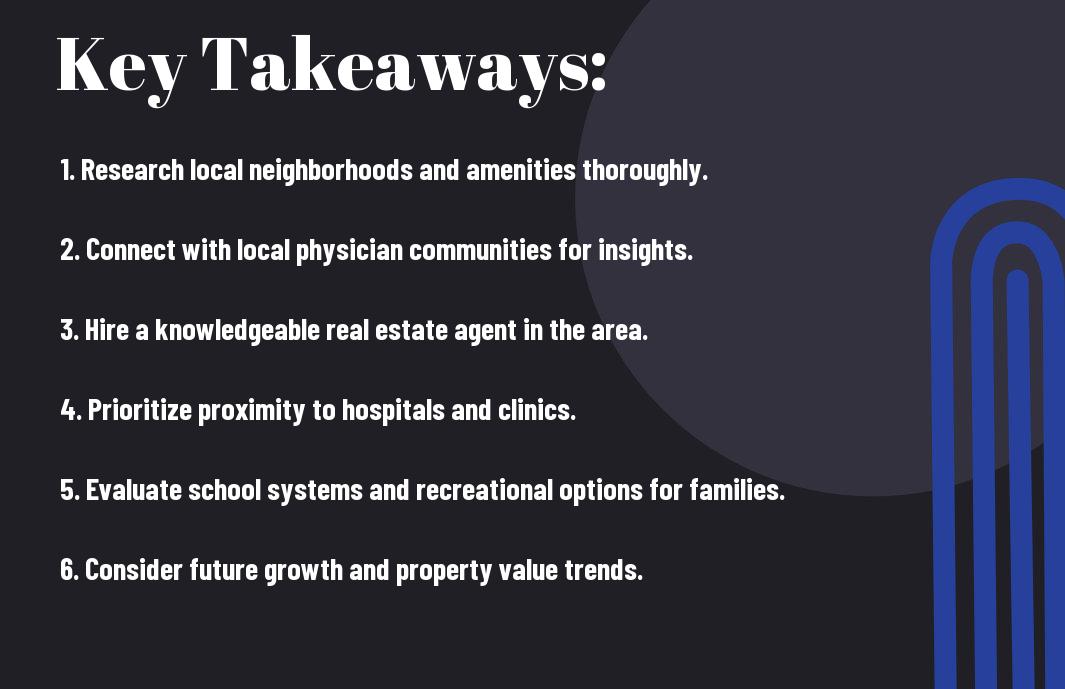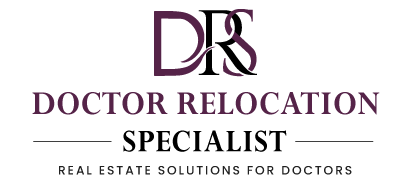Home is not just a place; it’s where your journey as a physician continues. As you begin on the exciting adventure of relocating to a new city, it’s crucial to navigate the real estate landscape effectively. This guide will equip you with practical strategies tailored specifically for healthcare professionals, ensuring you find the ideal home that aligns with both your professional and personal needs. From understanding the local market to evaluating neighborhoods, you will gain the insights necessary to make informed decisions with confidence.
Understanding the Local Real Estate Market
Your first step in finding your dream home is to gain a thorough understanding of the local real estate market. As a physician relocating for a new job or opportunity, it’s important to know how various factors like location, pricing, and amenities play into your home-buying decision. An informed perspective on the market will empower you to make confident choices that suit your lifestyle and professional needs.
Researching Neighborhoods
Market analysis begins with researching neighborhoods that align with your lifestyle preferences and professional requirements. Explore aspects like local schools, access to healthcare facilities, commuting options, and community amenities. By investing time in this research, you can identify areas that not only fit your budget but also provide a welcoming environment for both you and your family.
Evaluating Market Trends
An effective evaluation of market trends can guide your home-buying decisions, helping you anticipate future opportunities and challenges. Look into sales history, average days on the market, and pricing fluctuations to better understand your potential investment.
Trends indicate how property values in an area have shifted over time, which can significantly affect your buying power. By analyzing seasonal fluctuations and economic indicators, you can effectively gauge whether it’s a buyer’s or seller’s market. Additionally, consider factors like local developments and changes in zoning laws, as these can influence future property values and neighborhood dynamics, ensuring you make a smart, informed purchase.

Financing Your Dream Home
You have several financing options available to help you secure your dream home. Understanding these choices will empower you to make informed decisions that align with your financial situation and long-term goals. Exploring different mortgage products, interest rates, and terms can significantly impact your overall investment.
Mortgage Options for Physicians
Between traditional loans and specialized programs designed specifically for physicians, you can find a mortgage solution that suits your unique circumstances. These options often include benefits such as lower down payments, competitive interest rates, and reduced private mortgage insurance requirements.
Budgeting and Financial Considerations
At the heart of a successful home purchase is diligent budgeting and financial planning. Assessing your income, expenses, and savings will enable you to determine a comfortable price range for your new home.
And when planning your budget, consider not only the monthly mortgage payments but also associated costs such as property taxes, homeowner’s insurance, maintenance, and utilities. It’s crucial to account for these expenses to avoid financial strain. Factor in your lifestyle, future goals, and potential changes in your income, allowing yourself flexibility in your budgeting strategy. This comprehensive approach will help ensure that your new home remains a source of joy and not a financial burden.
Working with a Real Estate Agent
Unlike searching for a home on your own, partnering with a skilled real estate agent can help streamline the process of finding your dream home in a new city. An experienced agent brings local market insights and expertise, ensuring you make informed decisions while navigating the complexities of the housing market.
Choosing the Right Agent
Between assessing your specific needs and understanding the nuances of the local market, selecting the right real estate agent is important for a successful home-buying experience. Look for an agent who specializes in working with physicians or has experience with buyers relocating to new areas, as they can better understand your unique requirements.
Building a Trusting Relationship
Choosing the right real estate agent is just the beginning; building a trusting relationship is vital for a smooth home-buying journey. You want an agent who listens to your needs, communicates openly, and advocates for your best interests, making the experience collaborative and personalized.
Real trust is established through clear communication and shared goals. Be open about your preferences, budget, and timeline, and encourage your agent to provide honest feedback throughout the process. This rapport ensures that you both stay aligned on priorities, leading to a successful home search where you feel supported and well-informed every step of the way.
Identifying Must-Have Features
Not all homes will align with your vision for your dream home, so it’s important to identify must-have features that resonate with your lifestyle. Prioritizing your wants and needs will assist you in narrowing down your search in an unfamiliar city. Consider aspects like proximity to your workplace, accessibility to quality schools, and nearby amenities that complement your daily routines. Establishing a clear checklist can streamline your home-buying process and help you make informed choices that enhance your well-being and satisfaction.
Prioritizing Needs vs. Wants
Identifying your needs versus your wants is vital as you navigate the home-buying process. Needs often encompass important features such as the number of bedrooms, location, and proximity to your workplace, while wants might include specifics like a pool or a particular style of architecture. To clarify these aspects, make a list categorizing each element, ensuring that you focus on what will bring you the most value in your new home.
Adaptability for Future Changes
The importance of adaptability cannot be understated when selecting your ideal home. As a physician, your career can evolve, impacting your lifestyle and housing requirements. Consider factors that allow for flexibility, such as extra rooms for a growing family, space for a home office, or a layout that can accommodate different lifestyle needs over time.
Changes in your career or family life may prompt a need for more space or different amenities. By selecting a home with features that foster adaptability, you can avoid the hassle of moving again soon. Consider versatile spaces like finished basements or open floor plans that can easily transition as your needs shift. This foresight ensures your home remains a fit for years to come, providing both comfort and functionality in an ever-evolving landscape.
Navigating School Districts and Amenities
Many factors influence your decision when moving to a new city, but navigating school districts and local amenities is paramount. Understanding the quality of schools in the area can affect your family life significantly and impact property values. Additionally, knowing what recreational, shopping, and dining options are nearby can enhance your overall experience in your new home. Prioritizing these aspects ensures you find a neighborhood that aligns with your family’s needs and lifestyle.
Importance of Quality Education
Across various studies, it is evident that access to high-quality education amplifies your children’s future opportunities. A strong school district not only nurtures academic excellence but can also increase your home’s resale value. Evaluating school ratings, extracurricular programs, and overall community engagement becomes crucial when selecting a home. Your kids deserve the best educational foundation, which ultimately contributes to their development and success.
Proximity to Healthcare Facilities
Before settling into your new home, it’s paramount to consider the proximity to healthcare facilities. Easy access to hospitals and clinics ensures that you and your family receive timely medical attention in emergencies or for routine care. This consideration is especially vital for healthcare professionals like you, who understand the importance of quality healthcare access.
In fact, living near reputable healthcare facilities can provide peace of mind for you and your family. Knowing the availability of specialized medical services, urgent care centers, and trusted practitioners can make all the difference in your well-being. Additionally, if you work long hours or have unpredictable schedules, being close to healthcare services allows you to address health concerns promptly, which is crucial for maintaining a balanced life. Balancing work and personal health is vital; ensure your new neighborhood supports both.

Making Offers and Negotiating
Despite the competitive nature of the real estate market, effectively making offers and negotiating can significantly enhance your chances of securing your dream home. As a physician relocating to a new city, it’s necessary to leverage your unique position and engage a skilled real estate agent who understands local market dynamics. Developing a clear strategy and being prepared to act quickly when you find the right property will give you an edge in the bidding process.
Strategies for Competitive Bidding
Negotiating in a competitive environment requires a well-thought-out strategy. Start by researching recent sales in the neighborhood to establish a benchmark for your offer. Being flexible with closing dates or offering to waive certain contingencies can make your bid more attractive to sellers. Lastly, consider including a personal letter with your offer to establish an emotional connection and demonstrate your commitment to the property.
Understanding Purchase Agreements
Understanding the components of a purchase agreement is vital to protecting your interests in a real estate transaction. You’ll need to familiarize yourself with terms, conditions, and contingencies included in the contract to avoid misunderstandings and ensure a smooth process.
In fact, a purchase agreement typically outlines necessary aspects like the offer price, deposit amount, and closing date. You should pay close attention to contingencies, such as home inspections and financing, which protect you if unexpected issues arise. Make sure to review all aspects of the agreement with your agent and consider consulting a legal professional if any parts are unclear. This diligence will help you avoid complications and safeguard your investment.
Conclusion
Conclusively, finding your dream home in a new city requires a strategic approach tailored to your unique needs as a physician. By understanding the local real estate market, leveraging professional networks, and prioritizing proximity to your workplace, you can streamline your search and make informed decisions. Utilize online resources, seek assistance from knowledgeable agents, and consider your lifestyle preferences to ensure that your new home seamlessly aligns with your professional and personal goals. With the right strategies in place, your transition to a new city can lead to fulfilling living arrangements that enhance both your career and quality of life.

